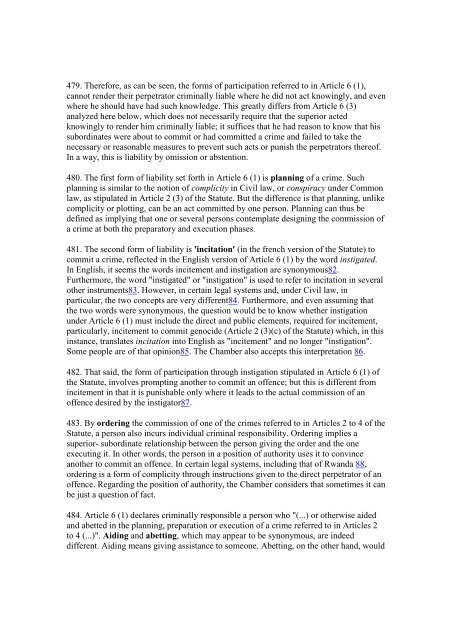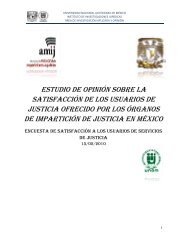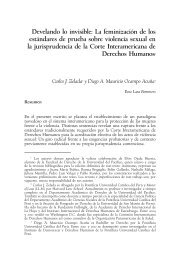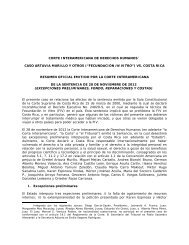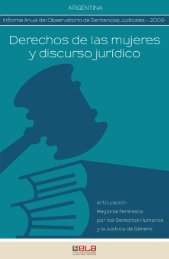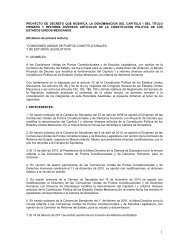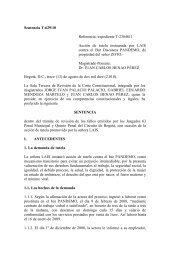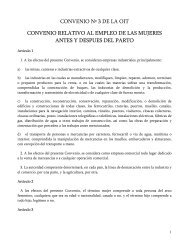479. There<strong>for</strong>e, as can be seen, the <strong>for</strong>ms of participation referred to in Article 6 (1),cannot render their perpetrator criminally liable where he did not act knowingly, and evenwhere he should have had such knowledge. This greatly differs from Article 6 (3)analyzed here below, which does not necessarily require that the superior actedknowingly to render him criminally liable; it suffices that he had reason to know that hissubordinates were about to commit or had committed a crime and failed to take thenecessary or reasonable measures to prevent such acts or punish the perpetrators thereof.In a way, this is liability by omission or abstention.480. The first <strong>for</strong>m of liability set <strong>for</strong>th in Article 6 (1) is planning of a crime. Suchplanning is similar to the notion of complicity in Civil law, or conspiracy under Commonlaw, as stipulated in Article 2 (3) of the Statute. But the difference is that planning, unlikecomplicity or plotting, can be an act committed by one person. Planning can thus bedefined as implying that one or several persons contemplate designing the commission ofa crime at both the preparatory and execution phases.481. The second <strong>for</strong>m of liability is 'incitation' (in the french version of the Statute) tocommit a crime, reflected in the English version of Article 6 (1) by the word instigated.In English, it seems the words incitement and instigation are synonymous82.Furthermore, the word "instigated" or "instigation" is used to refer to incitation in severalother instruments83. However, in certain legal systems and, under Civil law, inparticular, the two concepts are very different84. Furthermore, and even assuming thatthe two words were synonymous, the question would be to know whether instigationunder Article 6 (1) must include the direct and public elements, required <strong>for</strong> incitement,particularly, incitement to commit genocide (Article 2 (3)(c) of the Statute) which, in thisinstance, translates incitation into English as "incitement" and no longer "instigation".Some people are of that opinion85. The Chamber also accepts this interpretation 86.482. That said, the <strong>for</strong>m of participation through instigation stipulated in Article 6 (1) ofthe Statute, involves prompting another to commit an offence; but this is different fromincitement in that it is punishable only where it leads to the actual commission of anoffence desired by the instigator87.483. By ordering the commission of one of the crimes referred to in Articles 2 to 4 of theStatute, a person also incurs individual criminal responsibility. Ordering implies asuperior- subordinate relationship between the person giving the order and the oneexecuting it. In other words, the person in a position of authority uses it to convinceanother to commit an offence. In certain legal systems, including that of <strong>Rwanda</strong> 88,ordering is a <strong>for</strong>m of complicity through instructions given to the direct perpetrator of anoffence. Regarding the position of authority, the Chamber considers that sometimes it canbe just a question of fact.484. Article 6 (1) declares criminally responsible a person who "(...) or otherwise aidedand abetted in the planning, preparation or execution of a crime referred to in Articles 2to 4 (...)". Aiding and abetting, which may appear to be synonymous, are indeeddifferent. Aiding means giving assistance to someone. Abetting, on the other hand, would
involve facilitating the commission of an act by being sympathetic thereto. The issue hereis to whether the individual criminal responsibility provided <strong>for</strong> in Article 6(1) is incurredonly where there was aiding and abetting at the same time. The Chamber is of the opinionthat either aiding or abetting alone is sufficient to render the perpetrator criminally liable.In both instances, it is not necessary <strong>for</strong> the person aiding or abetting another to committhe offence to be present during the commission of the crime.485. The Chamber finds that, in many legal systems, aiding and abetting constitute actsof complicity. However, though akin to the constituent elements of complicity, theythemselves constitute one of the crimes referred to in Articles 2 to 4 of the Statute,particularly, genocide. The Chamber is consequently of the opinion that when dealingwith a person Accused of having aided and abetted in the planning, preparation andexecution of genocide, it must be proven that such a person did have the specific intent tocommit genocide, namely that, he or she acted with the intent to destroy in whole or inpart, a national, ethnical, racial or religious group, as such; whereas, as stated supra, thesame requirement is not needed <strong>for</strong> complicity in genocide89.486. Article 6(3) of the Statute deals with the responsibility of the superior, or commandresponsibility. This principle, which derives from the principle of individual criminalresponsibility as applied in the Nuremberg and Tokyo trials, was subsequently codified inArticle 86 of the Additional Protocol I to the Geneva Conventions of 8 June 1977.487. Article 6 (3) stipulates that:"The fact that any of the acts referred to in Articles 2 to 4 of the present Statute wascommitted by a subordinate does not relieve his or her superior of criminal responsibilityif he or she knew or had reason to know that the subordinate was about to commit suchacts or had done so and the superior failed to take the necessary and reasonable measuresto prevent such acts or to punish the perpetrators thereof".488. There are varying views regarding the Mens rea required <strong>for</strong> commandresponsibility. According to one view it derives from a legal rule of strict liability, that is,the superior is criminally responsible <strong>for</strong> acts committed by his subordinate, without itbeing necessary to prove the criminal intent of the superior. Another view holds thatnegligence which is so serious as to be tantamount to consent or criminal intent, is alesser requirement. Thus, the "Commentary on the Additional Protocols of 8 June 1977 tothe Geneva Conventions of 12 August 1949" stated, in reference to Article 86 of theAdditional Protocol I, and the mens rea requirement <strong>for</strong> command responsibility that:"[...] the negligence must be so serious that it is tantamount to malicious intent, apartfrom any link between the conduct in question and the damage that took place. Thiselement in criminal law is far from being clarified, but it is essential, since it is preciselyon the question of intent that the system of penal sanctions in the Conventions isbased"90.489. The Chamber holds that it is necessary to recall that criminal intent is the moralelement required <strong>for</strong> any crime and that, where the objective is to ascertain the individual
- Page 2 and 3:
1.2. The Indictment1.3. Jurisdictio
- Page 4 and 5:
eports2 which indicated that acts o
- Page 6 and 7:
3. Jean Paul AKAYESU, born in 1953
- Page 8 and 9:
16. Jean Paul AKAYESU, on or about
- Page 10 and 11:
Counts 7-8(Crimes Against Humanity)
- Page 12 and 13:
c) Deliberately inflicting on the g
- Page 14 and 15:
1.4. The Trial1.4.1. Procedural Bac
- Page 16 and 17:
y the opening statement for the Def
- Page 18 and 19:
y the Tribunal for crimes related t
- Page 20 and 21:
38. Regarding the Gishyeshye meetin
- Page 22 and 23:
witness was lying because he or she
- Page 24 and 25:
in the commune. His de facto author
- Page 26 and 27:
70. Apart from asking the prefect t
- Page 28 and 29:
84. According to the testimony of D
- Page 30:
Scores of political leaders were im
- Page 33 and 34:
his listeners to avoid the error of
- Page 35 and 36:
111. The killing of Tutsi which hen
- Page 37 and 38:
killed on the grounds that the foet
- Page 39 and 40:
128. In conclusion, it should be st
- Page 41 and 42:
Witness statements137. During the t
- Page 43 and 44:
protection of witnesses issued by t
- Page 45 and 46:
covered anyone who had anti-Tutsi t
- Page 47 and 48:
Tutsi and the Tutsi were accused of
- Page 49 and 50:
as "two armies", "two belligerents"
- Page 51 and 52:
"The primary criterion for [definin
- Page 53 and 54:
180. Many witnesses testified regar
- Page 55 and 56:
stated in that Decision, it did not
- Page 57 and 58:
deeds. For these reasons, the Chamb
- Page 59 and 60:
Concerning the allegation that at l
- Page 61 and 62:
turned over alive to Akayesu, and t
- Page 63 and 64:
younger brothers. He stated that he
- Page 65 and 66:
237. Karangwa testified under cross
- Page 67 and 68:
three brothers lie on their stomach
- Page 69 and 70:
known as Usuri (phonetic spelling)
- Page 71 and 72:
Karangwa's explanation for the inco
- Page 73 and 74:
Count 3, Crimes against Humanity (e
- Page 75 and 76: those killed were professors from R
- Page 77 and 78: 290. Witness DCC for the Defence, d
- Page 79 and 80: children, and old people. The Chamb
- Page 81 and 82: further that he had not heard of Ak
- Page 83 and 84: to fetch the one who remains', a pr
- Page 85 and 86: sector councillors called on the cr
- Page 87 and 88: According to witness A, the bourgme
- Page 89 and 90: present took it to mean that the Tu
- Page 91 and 92: 355. The Accused himself confirmed
- Page 93 and 94: 364. Paragraph 15 of the Indictment
- Page 95 and 96: The witness said a certain Françoi
- Page 97 and 98: has not been proved beyond reasonab
- Page 99 and 100: who had come to his house. He said
- Page 101 and 102: Interahamwe at the entrance, carryi
- Page 103 and 104: ack to the bureau communal and on t
- Page 105 and 106: Victim Y (Witness N), a [68] year o
- Page 107 and 108: which were at times committed by mo
- Page 109 and 110: communal into a forest in the area
- Page 111 and 112: clubbing a young teacher who had be
- Page 113 and 114: 434. Two days after arriving at the
- Page 115 and 116: he went into hiding during the mass
- Page 117 and 118: ureau communal, but he insisted tha
- Page 119 and 120: taken away from the bureau communal
- Page 121 and 122: The Accused himself testified that
- Page 123 and 124: 464. In that case, when the matter
- Page 125: "A person who planned, instigated,
- Page 129 and 130: 493. In accordance with the said pr
- Page 131 and 132: Deliberately inflicting on the grou
- Page 133 and 134: y a psychological relationship betw
- Page 135 and 136: Chamber notes that, as stated above
- Page 137 and 138: • complicity by procuring means,
- Page 139 and 140: 547. Consequently, where a person i
- Page 141 and 142: underscoring their commitment to se
- Page 143 and 144: character134. In fact, the concept
- Page 145 and 146: 575. The definition of crimes again
- Page 147 and 148: grounds mentioned in Article 3 of t
- Page 149 and 150: accepted definition of this term in
- Page 151 and 152: adopted primarily to protect the vi
- Page 153 and 154: 610. Whilst the Chamber is very muc
- Page 155 and 156: description, namely, what constitut
- Page 157 and 158: forces to plan and carry out concer
- Page 159 and 160: 635. There is no clear provision on
- Page 161 and 162: 7.2. Count 5 - Crimes against human
- Page 163 and 164: 663. The definition of crimes again
- Page 165 and 166: 677. The Tribunal notes that eviden
- Page 167 and 168: 685. In the light of its factual fi
- Page 169 and 170: 692. The Tribunal finds, under Arti
- Page 171 and 172: determine, as far as each proven fa
- Page 173 and 174: the Tutsi in general. Akayesu who h
- Page 175 and 176: 722. As regards the allegations in
- Page 177 and 178:
732. The rape of Tutsi women was sy
- Page 179 and 180:
Chamber finds beyond a reasonable d
- Page 181 and 182:
Footnote 11. Decision: Order for Co
- Page 183 and 184:
Footnote 41. Article 104 of the Loi
- Page 185 and 186:
Footnote 68. Dictionnaire Rwandais-
- Page 187 and 188:
Footnote 103. "Principles of Intern
- Page 189 and 190:
Footnote 134. Secretary General's R
- Page 191:
Footnote 171. See General Legal Fin


